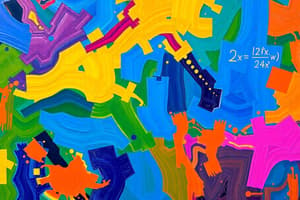Podcast
Questions and Answers
Which equation represents the separable form of the given differential equation?
Which equation represents the separable form of the given differential equation?
- $(P(1, v) + vQ(1, v)) dx + xQ(1, v) dv = 0$
- $(x^2 + x^2v^2) dx + x^2v(v dx + x dv) = 0$
- $P(x, y) dx + Q(x, y) dy = 0$
- $(1 + 2v^2) dx + xv dv = 0$ (correct)
Which substitution is made to find the solution for any homogeneous equation?
Which substitution is made to find the solution for any homogeneous equation?
- $y = xv$ (correct)
- $v = y/x$
- $v = x/y$
- $y = vx$
Which term is used to transform the given equation into a separable form?
Which term is used to transform the given equation into a separable form?
- Integrating factor (correct)
- Collecting terms
- Homogeneity
- Common factor
Which equation represents the final answer after substituting $v = y/x$?
Which equation represents the final answer after substituting $v = y/x$?
What is the integrating factor for the given differential equation?
What is the integrating factor for the given differential equation?
Which type of differential equations are explored in this section?
Which type of differential equations are explored in this section?
What is the purpose of allowing solutions defined implicitly by equations of the form $F(x, y) = C$?
What is the purpose of allowing solutions defined implicitly by equations of the form $F(x, y) = C$?
What is the language used to describe the symmetrized differential equation?
What is the language used to describe the symmetrized differential equation?
What is the differential form in the two variables $x$ and $y$?
What is the differential form in the two variables $x$ and $y$?
When is $y$ a solution to the differential equation $P(x, y) + Q(x, y) \frac{dy},{dx} = 0$?
When is $y$ a solution to the differential equation $P(x, y) + Q(x, y) \frac{dy},{dx} = 0$?
Which equation represents the differential form variant of the differential equation $\omega = x dx + y dy = 0$?
Which equation represents the differential form variant of the differential equation $\omega = x dx + y dy = 0$?
What is the equation that represents the solutions defined implicitly by the differential equation $\omega = x dx + y dy = 0$?
What is the equation that represents the solutions defined implicitly by the differential equation $\omega = x dx + y dy = 0$?
What are the solution curves of the differential equation $\omega = x dx + y dy = 0$?
What are the solution curves of the differential equation $\omega = x dx + y dy = 0$?
What are the integral curves of a differential equation defined by the equation $F(x, y) = C$?
What are the integral curves of a differential equation defined by the equation $F(x, y) = C$?
What is the differential form called if it is the differential of a continuously differentiable function?
What is the differential form called if it is the differential of a continuously differentiable function?
Which of the following is a criterion for exactness of a differential equation?
Which of the following is a criterion for exactness of a differential equation?
Which of the following statements is true about the integrating factor for a separable equation?
Which of the following statements is true about the integrating factor for a separable equation?
What is the integrating factor for the equation $(xy - 2)dx + (x^2 - xy)dy = 0$?
What is the integrating factor for the equation $(xy - 2)dx + (x^2 - xy)dy = 0$?
What is the general solution to the equation $(xy - 2)dx + (x^2 - xy)dy = 0$?
What is the general solution to the equation $(xy - 2)dx + (x^2 - xy)dy = 0$?
When is a differential equation said to be homogeneous?
When is a differential equation said to be homogeneous?
Which of the following is an integrating factor for the differential equation $(x + 2y^2)dx - 2xydy = 0$?
Which of the following is an integrating factor for the differential equation $(x + 2y^2)dx - 2xydy = 0$?
Which type of differential equation has the form $dy/dx = a(x)y + f(x)$?
Which type of differential equation has the form $dy/dx = a(x)y + f(x)$?
What is the general solution to the linear equation $[a(x)y + f(x)]dx - dy = 0$?
What is the general solution to the linear equation $[a(x)y + f(x)]dx - dy = 0$?
What is the solution to the separable equation $-y^2dx + x^3dy = 0$?
What is the solution to the separable equation $-y^2dx + x^3dy = 0$?
What is the condition for a differential equation to be separable?
What is the condition for a differential equation to be separable?
Which equation represents a differential form that is exact?
Which equation represents a differential form that is exact?
What is the condition for a differential form to be exact?
What is the condition for a differential form to be exact?
What is the solution to the differential equation $P(x, y)dx + Q(x, y)dy = 0$ when it is exact?
What is the solution to the differential equation $P(x, y)dx + Q(x, y)dy = 0$ when it is exact?
What is the solution to the differential equation $P(x, y)dx + Q(x, y)dy = 0$ when it is exact, using the alternate method?
What is the solution to the differential equation $P(x, y)dx + Q(x, y)dy = 0$ when it is exact, using the alternate method?
What is the condition for a differential form to be exact in a rectangle R?
What is the condition for a differential form to be exact in a rectangle R?
Flashcards are hidden until you start studying




